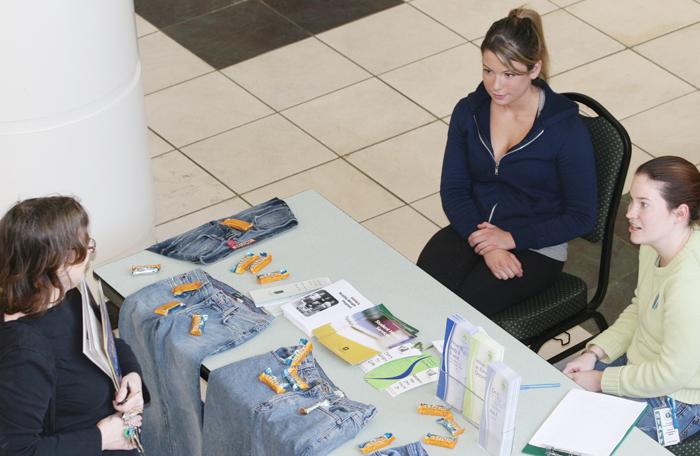One size fits all for cause
Junior Michelle Faddoul, center, and Health Educator Kalyn Coppedge, right, talk about the Great Jeans Giveaway in the University Union on Friday.:
March 15, 2007
Drastic weight loss, impulsive dieting and obsessive exercising are three things that characterized her five-year struggle with an eating disorder.
Junior psychology major Michelle Faddoul, who does not consider herself to have been anorexic or bulimic, said that her problems with eating and exercising began in the seventh grade, when most other 13-year-old girls were thinking about clothes, boys and grades.
Faddoul said that the difficulties she faced prompted her to become a student volunteer with the Sacramento State Student Health Center, which has joined in the fight against eating disorder and body-image problems by taking part in “The Great Jeans Giveaway.”
The two week long event, which began on Feb. 26 and will continue until March 16, is part of the 20th annual National Eating Disorders Awareness Week and Women’s History Month.
Student Health Educator Kalyn Coppedge said that the campaign, which calls for women to donate jeans that are either too old, too small or too big, was developed as a way for women to get rid of jeans that make them feel bad about themselves and the way they look.
Faddoul said that she feels events like the jean giveaway and the entire National Eating Disorders Awareness Week are important because they have the ability to help people look at their lives and selves in a different, more positive, way. She went on to say that additional programs for those who are currently going through the recovery process would be helpful as well.
“The campaign is meant to push the idea that weight is not only about how much you eat or even how you live, sometimes it’s just about genetics,” Coppedge said. “(We’re trying to combat) unhealthy dieting. We want women to feel comfortable with their bodies as they are.”
Looking back, Faddoul said it was hard to pinpoint when her disorder began.
“I think that what sparked it was seeing models on TV and in magazines and wanting to look like them,” Faddoul said. “My best friend, at the time, and I decided that the only way to achieve this was to cut back on calories and increase exercise.”
Faddoul said that the problem became evident to others when she became obsessed with watching what she ate and began exercising every day for about two and a half hours, or until she felt faint.
“My relationship with my parents, friends and school were all starting to deteriorate because the only things I cared about were food and weight,” Faddoul said. “I just wanted to be alone with my scale and my running shoes. I couldn’t even have a conversation with my parents without getting upset, anxious or rude.”
Faddoul said it was the continual support of her family that eventually helped her find strength and courage she needed to seek treatment.
“I decided to get help when I realized that my life was becoming an endless cycle of hatred for myself and everything around me,” Faddoul said. “I began treatment with a dietician and started regular counseling sessions?my family stuck by me through all of it.”
Coppedge said while the original intention of the health center was to collect only women’s jeans, a number of people have brought in other articles of clothing, as well as men’s jeans.
“I was surprised to see that men were also donating clothes,” Coppedge said. “We’ve actually had more men donating clothes than women.”
Coppedge said all donations will either go to Women Escaping a Violent Environment or My Sister’s House.
WEAVE Community Relations and Event Coordinator Angela D’Arcy said that while the program is primarily geared toward women, services are actually available for children, men and teens, as well.
“WEAVE is the primary provider of crisis intervention, advocacy and counseling programs in Sacramento County,” D’Arcy said. “We have a partnership with law enforcement? and our services cover everything from job reentry help and legal assistance to group and individual counseling, dissolution (or divorce) workshops and a safe house.”
D’Arcy went on to say that all donations made to WEAVE are sent to one of two WEAVE thrift stores, either in downtown Sacramento or Carmichael, where they are then sold.
“All of the money received from the thrift stores is then put back into the program,” D’Arcy said. “Also, a lot of the people who use our safe house have to leave their homes in a hurry and don’t have time to grab clothes for themselves or their children, so we give them (free vouchers) to the thrift stores.”
Faddoul said that after nearly three years in recovery she is still not completely cured. She went on to say that an eating disorder is something you have to deal with for the rest of your life.
“I still have issues and anxiety around food that are rooted in my eating disorder, but I have learned to deal with them,” Faddoul said.
Faddoul added that her biggest accomplishment to date has been her recovery and how far she has come since her struggles with an eating disorder.
“Not only am I totally OK with food now, but I am also using it as a source of energy to do the things I love,” Faddoul said. “I recently decided that I am going to start participating in figure competitions, which can be thought of as a more feminine approach to competitive bodybuilding, where the goal is to have muscle, but not too much.”
Faddoul has come so far in her recovery that she says that her after graduation goals include going into psychotherapy, in order to work with and help people with eating disorders, while doing figure modeling on the side.
When asked what advice she would give her future patients or anybody struggling with an eating disorder or body image problem she simply said, “get help because nobody should have to live that way.”
“If you have an eating disorder or any unrealistic thoughts about what your weight should be, talk to someone about it,” Faddoul said. “There is help?it may be a long journey, but it’s worth it in the end.”
According to the National Eating Disorders Association website, nearly 10 million American women and 1 million American men are currently fighting the battle that Faddoul said she’s winning.
Ashley Evans can be reached at [email protected]























































































































